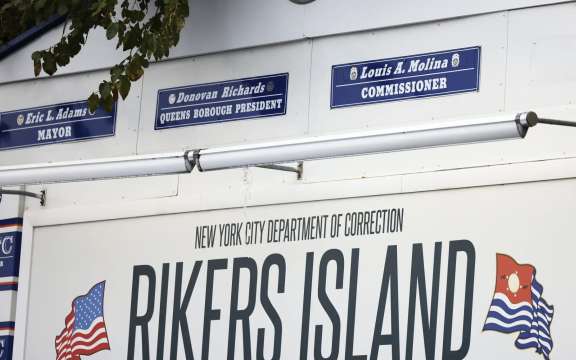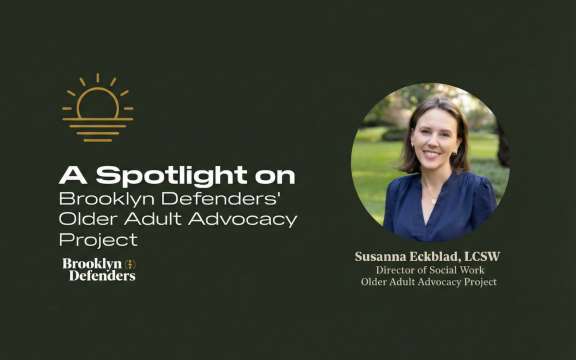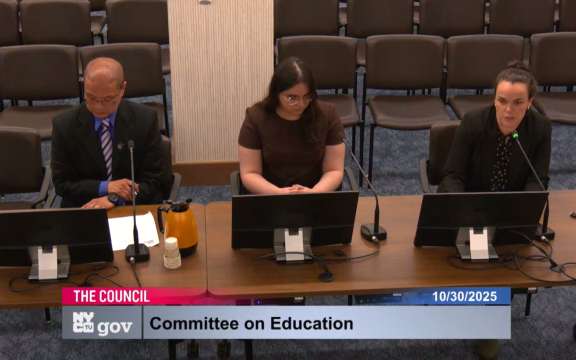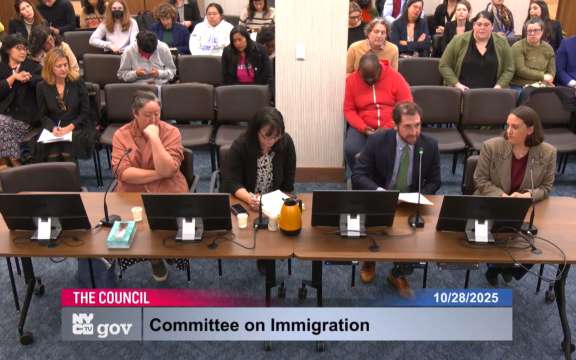BDS Testimony before NYC Taxi and Limousine Commission on Rule Changes Related to License Suspensions
TESTIMONY OF:
Gabriel Freiman – Attorney-in-Charge, Education and Employment Practice
BROOKLYN DEFENDER SERVICES
Presented Before
The New York City Taxi and Limousine Commission
October 19, 2020
My name is Gabriel Freiman, and I am the attorney-in-charge at the Employment Practice of Brooklyn Defender Services. Brooklyn Defender Services (BDS) provides multi-disciplinary and client-centered criminal, family, and immigration defense, as well as civil legal services, social work support and advocacy, for over 30,000 clients in Brooklyn every year. I thank the Taxi and Limousine Commission for holding this hearing and for providing us with the opportunity to testify.
BDS’s employment practice provides legal representation and informal advocacy to clients facing employment discrimination due to current or prior contact with the criminal justice system. Our clients face numerous formal and informal barriers to employment. Many are suspended or terminated from employment upon arrest and before any finding of criminal culpability. This is particularly true for many of our clients who are licensed drivers through the Taxi and Limousine Commission.
BDS commends the Commission’s proposed rule changes. While the proposed rule changes will improve the summary suspension process, we ask that the Commission also consider the following changes:
Eliminate Automatic Suspensions
BDS recommends that the Commission forgo its practice of automatically suspending TLC licenses for certain offenses. While we understand the Commission’s concern for the safety of its passengers, we firmly believe that an arrest, in and of itself, is a flawed risk indicator. Criminal charges are often misleading and provide little context into the actual incident that led to the arrest. It should not be discounted that many arrests are made on faulty or false reports and that when and if this is the case, it could take weeks to months before the individual is cleared of any criminal charges. This observation is more than anecdotal as courts have similarly recognized that the gap between the probable cause necessary to make an arrest and a factual determination of criminal culpability, is often filled with a risk of error.
Automatic license suspensions run afoul of the basic principle of innocent until proven guilty and this practice disproportionately affects communities of color. Low-income black and brown communities are too often the victims of discriminatory law enforcement practices.2 In fact, the overwhelming majority of our clients whose TLC licenses have been suspended due to a pending criminal case have been persons of color. Therefore, TLC’s practice of automatic suspensions has the potential to disproportionately and detrimentally impact black and brown licensees.
For these reasons, BDS recommends that the Commission abandon automatic license suspension and work with advocates across New York City to develop a screening mechanism to determine whether the criminal charges actually warrant a license suspension.
Suspensions Should be Made Based on Arraignment Charges
Although BDS believes that TLC should end its practice of automatic suspensions, if TLC does not abandon this practice, we believe that further clarification is necessary regarding suspension procedure. In regard to the proposed changes to subdivision (d) of section 68-15 of Title 35 of the Rules of the City of New York, we ask that all references to “criminal charges” or “charges” be changed to “arraignment charges.” This change is appropriate for the following reasons:
First, it is often the case that the arrest and arraignment charges differ. When an individual is arrested, the District Attorney’s office reviews the arrest charges and proceeds only on charges that it deems to be legally sufficient. It then falls on the driver, who may or may not be represented by counsel who is aware of TLC suspension practices, to notify the Commission that the arraignment charges differ. The TLC suspension unit be required to check whether the arrest and arraignment charges differ and suspend based only on the arraignment charges.
Second, we have seen an increase in the issuance of Desk Appearance Tickets (DATs) by the NYPD. DATs do not commence a criminal case, instead they direct an individual to appear in court at a later date for arraignment. Because the client has not been arraigned, they are not assigned counsel by the court until the arraignment date, which is often months away. The result is that drivers who receive DAT tickets are effectively suspended before the arrest is ever reviewed by the District Attorney’s Office and formally charged.
One BDS client’s experience is particularly illustrative. He was accused of engaging in a physical altercation with a friend. He vehemently denied the allegations and was ultimately issued a Desk Appearance Ticket that directed him to appear in court nearly four months after his arrest. Because he was never formerly arraigned, he was not assigned an attorney. After receiving notification that his TLC license was suspended, he tried for weeks to find an attorney to assist him. When he appeared in court four months later, his case was dismissed for legally insufficient evidence. His case highlights how a client can be deprived of their livelihood for charges that are never pursued by the District Attorney’s Office.
Use Initials or Redacted Names for OATH Decisions
Currently, if a licensee participates in a hearing to challenge their license suspension, the Administrative Law Judge’s decision is published to the Office of Administrative Trials and Hearings’ (OATH) online database. This database is available to the public and the decision is published whether or not the licensee prevails at the hearing. The decision always contains the driver’s full name and the criminal charges that led to their license suspension. Many of the decisions also contain detailed accounts of the unsubstantiated allegations and information regarding the licensee’s personal relationships.
We find that many licensees decline to challenge a summary suspension at a hearing because they understandably do not want a record of their arrest made publicly available. Often, our client’s criminal cases are on track toward a favorable resolution such as a dismissal, adjournment in contemplation of dismissal, or a non-criminal violation—all of which will eventually seal. In one instance, our client’s case was on track for dismissal. Because driving was our client’s only source of income, he wished to pursue a hearing to challenge his TLC license suspension. Upon learning that there would be a public decision issued even if his suspension was lifted, our client decided not to pursue a hearing as he didn’t want his children to one day find a decision detailing charges he vigorously contested. His case was ultimately dismissed, and his license restored, but the suspension caused severe hardship for his family.
Under current TLC rules and practice, if a driver has made the decision to challenge the summary suspension, a record of arrest and the charges will exist in perpetuity via the OATH online database even after a criminal case is sealed and made unavailable to the public, potential employers, and the courts. This practice undermines the very purpose of New York State’s sealing statutes. These published decisions force our clients to choose to fight for their immediate financial livelihood at the long-term cost of a permanent public record of their criminal case and the unsubstantiated allegations made against them.
Publishing decisions using only a driver’s initials is not without precedence at OATH. In 2019 an ALJ granted respondent’s request to omit her full name from the decision pursuant to OATH Rules of Practice Section 1-49 (d) due to the particularly personal sensitive nature of her testimony.Dep’t of Sanitation v. Anonymous, OATH Index No. 181/11 (Dec. 9, 2010). Further there is little public interest in the full name being publicly available because TLC has a revocation hearing procedure for drivers for drivers with substantiated charges.
Because of the substantial likelihood that summary suspension decisions will contain information concerning charges that may be eventually sealed, TLC should create a rule to anonymize summary suspension proceedings, BDS therefore recommends that TLC add a rule that instructs OATH issue TLC summary suspension decisions using only the licensee’s initials.
Reduce the Lengthy Process for Reinstatement
One purpose of the summary suspension procedure is to permit drivers to maintain their employment when doing so would not be a danger to public safety. However, under the current rules, a driver’s criminal case often will be favorably resolved prior to receiving a determination from the summary suspension process. The Commission’s proposed changes do little to alter this. Under the proposed changes, a driver could wait up to 45 days for a final decision regarding their license suspension, or even more depending on weekends and holidays. The lengthy time periods undermine their right to meaningfully challenge the threat to livelihood and financial security that a summary suspension imposes.
We suggest shortening each of the time periods governing the summary suspension procedure. We suggest that the rules require that a hearing be placed on the calendar within 3 days of a driver’s request, and that the OATH decision be issued within 3 days of the hearing. This would put summary suspension proceedings more in alignment with Krimstock proceedings, which OATH also administers, and other constitutionally-mandated post-deprivation proceedings, such as those under section 1028 of the Family Court Act.
Additionally, although we suggest eliminating chair review entirely under 68-15(d)(7), the lengthy period for chair review as currently proposed under 68-15(d)(8) is unnecessary and undermines the goal of speedy resolutions for summary suspensions. Our review of recent OATH decisions shows that the chair has been able to review ALJ reports and recommendations expeditiously, usually within a few business days. Although we applaud this practice, the proposed rules maintain the real possibility that chair review would impose an unnecessary financial burden on drivers. A rule change reducing chair review to two business days from receipt of the ALJ report and recommendation would cut out a significant piece of potential delay. As the TLC is the prosecutor of the summary suspension, it already has the necessary information relating to a driver, the charges, and the other Nnebe factors at the close of the hearing, and so this timeline would not impose a great burden on the TLC. Additionally, we propose substantial changes to proposed section 68-15(d)(8)—the section which governs the timeframe and procedure for chair review and potential adverse action by the chair—and do not believe that the proposed twenty days for chair review adequately protects drivers in terms of timeframe or procedure.
Eliminate Chair Review or Implement a Clear Standard
BDS proposes eliminating chair review of ALJ reports and recommendations entirely. Because summary suspension proceedings concern the licensure of drivers only in the interim period while charges are pending, the TLC retains the ability to pursue revocation proceedings. In this way, the rules permit chair review to impose an additional delay on the summary suspension process without a significant benefit to the public.
If chair review is maintained, the current rules should be altered to provide a clear standard of review, which the current language of “reasonable basis” lacks. BDS proposes that chair review be limited to whether: (a) substantial evidence from the hearing supports the ALJ report and recommendation; or (b) the ALJ report and recommendation contains a material misapplication of law that requires the Chair to reject or modify. By doing so, the rules would protect the deference that should be given to an ALJ’s assessment of the credibility of witnesses and the weight of the evidence. The rules would clarify that the scope of review of the OATH recommendation would be limited to the record developed at the hearing, and exclusive of outside evidence whose reliability has not been assessed by the OATH ALJ, thereby protecting the due process rights of the driver. Further, by limiting chair review to these discrete issues, the proposed lengthy timeline for chair review could be reduced to two days. Drivers who disagree with the Chair's decision on the existence of substantial evidence or error or law could be permitted to seek reconsideration from the Chair post-review.
We thank the TLC for the opportunity to comment on the proposed rules and remain available to clarify our suggestions or answer any questions. I can be reached at (347) 277-2668 or gfreiman@bds.org.




